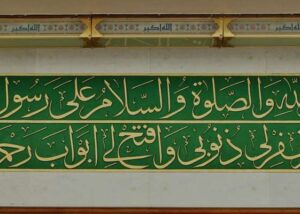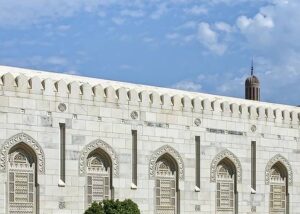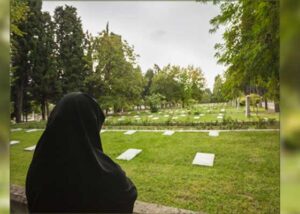Quran
Hadith
Islamic Text
Yes, non-Muslims can enter a Masjid. There are numerous Hadith narrations establishing the fact that Kufar (disbelievers) entered the Masjid of the Holy Prophet in Madinah.
أَبَا هُرَيْرَةَ رَضِيَ اللَّهُ عَنْهُ، قَالَ: بَعَثَ النَّبِيُّ صَلَّى اللهُ عَلَيْهِ وَسَلَّمَ خَيْلًا قِبَلَ نَجْدٍ، فَجَاءَتْ بِرَجُلٍ مِنْ بَنِي حَنِيفَةَ يُقَالُ لَهُ ثُمَامَةُ بْنُ أُثَالٍ، فَرَبَطُوهُ بِسَارِيَةٍ مِنْ سَوَارِي المَسْجِدِ، فَخَرَجَ إِلَيْهِ النَّبِيُّ صَلَّى اللهُ عَلَيْهِ وَسَلَّمَ، فَقَالَ: «مَا عِنْدَكَ يَا ثُمَامَةُ؟» فَقَالَ: عِنْدِي خَيْرٌ يَا مُحَمَّدُ، إِنْ تَقْتُلْنِي تَقْتُلْ ذَا دَمٍ، وَإِنْ تُنْعِمْ تُنْعِمْ عَلَى شَاكِرٍ، وَإِنْ كُنْتَ تُرِيدُ المَالَ فَسَلْ مِنْهُ مَا شِئْتَ، فَتُرِكَ حَتَّى كَانَ الغَدُ، ثُمَّ قَالَ لَهُ: «مَا عِنْدَكَ يَا ثُمَامَةُ؟» قَالَ: مَا قُلْتُ لَكَ: إِنْ تُنْعِمْ تُنْعِمْ عَلَى شَاكِرٍ، فَتَرَكَهُ حَتَّى كَانَ بَعْدَ الغَدِ، فَقَالَ: «مَا عِنْدَكَ يَا ثُمَامَةُ؟» فَقَالَ: عِنْدِي مَا قُلْتُ لَكَ، فَقَالَ: «أَطْلِقُوا ثُمَامَةَ» فَانْطَلَقَ إِلَى نَجْلٍ قَرِيبٍ مِنَ المَسْجِدِ، فَاغْتَسَلَ ثُمَّ دَخَلَ المَسْجِدَ، فَقَالَ: أَشْهَدُ أَنْ لاَ إِلَهَ إِلَّا اللَّهُ، وَأَشْهَدُ أَنَّ مُحَمَّدًا رَسُولُ اللَّهِ
Abu Hurairah (May Allah Most High be pleased with him) said, The Prophet ﷺ sent some cavalry towards Najd and they captured a man from the tribe of Banu Hanifah. He was called Thumamah bin Uthaal. They tied him to one of the pillars of the Masjid. The Prophet ﷺ went to him and said, ‘What do you have (to say), O Thumamah?’ He replied, ‘I have goodness O Muhammad. If you kill me, then you would kill a person who has blood on his hands. If you show favor, then you show favor to a grateful individual. If you want wealth, then ask of it whatever you want.’ He was left till the next day. Then the Prophet ﷺ said to him, ‘What do you have (to say), O Thumamah?’ He said, ‘What I already said to you, if you show favor, then you show favor to a grateful individual.’ So, he ﷺ left him till the next day, then said to him, ‘What do you have (to say), O Thumamah?’ He said, ‘I have that which I already told you.’ So, the Prophet ﷺ said, ‘Release Thumamah.’ So, he went to a source of water, near the Masjid, washed himself and then entered the Masjid. He said, ‘I testify that there is no God except Allah, and I testify that Muhammad is the Messenger of Allah.’ (Sahih al-Bukhari, 4372).
In the authentic Hadith above we see that one of the enemies of Islam was tied to a pillar in the Masjid. Later he was released and subsequently became Muslim. His name was Thumamah bin Uthaal (May Allah Most High be pleased with him), and he was blessed to become a Sahabi after having fought against the Muslims.
The Hadith serves as evidence for the permissibility of non-Muslims entering the Masjid. As does the following Hadith, which speaks of the Islam of Sayidina Adi bin Hatim (May Allah Most High be pleased with him).
عَنْ عَدِيِّ بْنِ حَاتِمٍ، قَالَ: أَتَيْتُ رَسُولَ اللَّهِ صَلَّى اللَّهُ عَلَيْهِ وَسَلَّمَ وَهُوَ جَالِسٌ فِي المَسْجِدِ فَقَالَ القَوْمُ: هَذَا عَدِيُّ بْنُ حَاتِمٍ وَجِئْتُ بِغَيْرِ أَمَانٍ وَلَا كِتَابٍ، فَلَمَّا دُفِعْتُ إِلَيْهِ أَخَذَ بِيَدِي، وَقَدْ كَانَ قَالَ قَبْلَ ذَلِكَ: «إِنِّي لَأَرْجُو أَنْ يَجْعَلَ اللَّهُ يَدَهُ فِي يَدِي»، قَالَ: فَقَامَ فَلَقِيَتْهُ امْرَأَةٌ وَصَبِيٌّ مَعَهَا، فَقَالَا: إِنَّ لَنَا إِلَيْكَ حَاجَةً. فَقَامَ مَعَهُمَا حَتَّى قَضَى حَاجَتَهُمَا، ثُمَّ أَخَذَ بِيَدِي حَتَّى أَتَى بِي دَارَهُ، فَأَلْقَتْ لَهُ الوَلِيدَةُ وِسَادَةً فَجَلَسَ عَلَيْهَا، وَجَلَسْتُ بَيْنَ يَدَيْهِ، فَحَمِدَ اللَّهَ وَأَثْنَى عَلَيْهِ، ثُمَّ قَالَ: «مَا يُفِرُّكَ أَنْ تَقُولَ لَا إِلَهَ إِلَّا اللَّهُ. فَهَلْ تَعْلَمُ مِنْ إِلَهٍ سِوَى اللَّهِ؟». قَالَ: قُلْتُ: لَا. قَالَ: ثُمَّ تَكَلَّمَ سَاعَةً ثُمَّ قَالَ: «إِنَّمَا تَفِرُّ أَنْ تَقُولَ اللَّهُ أَكْبَرُ، وَتَعْلَمُ شَيْئًا أَكْبَرُ مِنَ اللَّهِ؟» قَالَ: قُلْتُ: لَا، قَالَ: «فَإِنَّ اليَهُودَ مَغْضُوبٌ عَلَيْهِمْ، وَإِنَّ النَّصَارَى ضُلَّالٌ» قَالَ: قُلْتُ: فَإِنِّي ضَيْفٌ مُسْلِمٌ، قَالَ: فَرَأَيْتُ وَجْهَهُ تَبَسَّطَ فَرَحًا. «هَذَا حَدِيثٌ حَسَنٌ غَرِيبٌ لَا نَعْرِفُهُ إِلَّا مِنْ حَدِيثِ سِمَاكِ بْنِ حَرْبٍ
Adi bin Hatim (May Allah Most High be pleased with him) said, I went to the Prophet ﷺ whilst he was sitting in the Masjid. The people said, it is Adi bin Hatim. I came without protection or a treaty. When I was brought to him ﷺ, he took my hand. Prior to that he had said, ‘I hope that Allah will place his hand in my hand.’ He ﷺ stood, and a woman who had a boy with her, met him and they said, we have a need from you. He ﷺ stood with them, until he was finished dealing with what they needed. Then he took me by the hand until he brought me to his house. A bondswoman placed a cushion so he ﷺ sat upon it. I sat in front of him. He praised and extolled Allah and then said, ‘What has caused you to flee from saying La Ilaha Illallah? Do you know of a god other than Allah?’ I said, no. Then he ﷺ spoke for some time, and then said, ‘Do you refuse to say Allahu Akbar because you know that there is something greater than Allah?’ I said, no. He ﷺ said, ‘Indeed the Jews have the wrath of Allah upon them, and the Christians are astray.’ I said, Indeed I am a Muslim and a guest. I saw his ﷺ face beaming with joy. (Sunan al-Tirmidhi 2953, Hasan).
There are many other examples of non-Muslims entering the Masjid in the time of the Holy Prophet ﷺ. See Sahih al-Bukhari Hadith number 63, Sunan Abi Dawood 488 and 3026. In their Hadith collections, some scholars have dedicated entire sections to the subject of non-Muslims entering the Masjid.
Due to the abundance of evidence available regarding the permissibility of disbelievers (Kufar) entering the Masjid, the Hanafi scholars made the ruling clear in their books.
جَازَ (دُخُولُ الذِّمِّيِّ مَسْجِدًا) مُطْلَقًا
(قَوْلُهُ وَجَازَ دُخُولُ الذِّمِّيِّ مَسْجِدًا) وَلَوْ جُنُبًا كَمَا فِي الْأَشْبَاهِ، وَفِي الْهِنْدِيَّةِ عَنْ التَّتِمَّةِ يُكْرَهُ لِلْمُسْلِمِ الدُّخُولُ فِي الْبِيعَةِ وَالْكَنِيسَةِ، وَإِنَّمَا يُكْرَهُ مِنْ حَيْثُ إنَّهُ مَجْمَعُ الشَّيَاطِينِ لَا مِنْ حَيْثُ إنَّهُ لَيْسَ لَهُ حَقُّ الدُّخُولِ اهـ وَانْظُرْ هَلْ الْمُسْتَأْمَنُ وَرَسُولُ أَهْلِ الْحَرْبِ مِثْلُهُ وَمُقْتَضَى اسْتِدْلَالِهِمْ عَلَى الْجَوَازِ بِإِنْزَالِ رَسُولِ اللَّهِ – صَلَّى اللَّهُ عَلَيْهِ وَسَلَّمَ – وَفْدَ ثَقِيفٍ فِي الْمَسْجِدِ جَوَازُهُ وَيُحَرَّرُ ط. (رد المحتار على الدر المختار)
Imam al-Haskafi: It is unrestrictedly permitted for a Dhimmi (non-Muslim resident of Muslim lands) to enter a Masjid.
Imam Ibn Abideen: His saying, it is permitted for a Dhimmi (non-Muslim resident of Muslim lands) to enter a Masjid, so even if he is in a state of (Janabah) major ritual impurity (it is still permitted) as mentioned in al-Ashbah. In al-Hindiyah it is narrated from al-Tatimmah that it is Makruh for a Muslim to enter a monastery or church. It is Makruh due to it being a gathering place for Shayateen, not due to him having no right to enter. Can a Mustaman (protected person) or a messenger from non-Muslim lands enter too? The evidence used dictates permissibility. Since the Messenger of Allah ﷺ settled the delegation of Thaqeef in the Masjid. So let it be considered, Tahtawi. (Radd al-Muhtaar).
Many people who run Masaajid (Mosques) invite non-Muslims into the Masjid to teach them about Islam. Sometimes this leads to people in the community opposing the entry of non-Muslims into the Masjid, since they believe it is impermissible. There is no need for such opposition, the position of the Hanafi Madhab clearly permits non-Muslims to enter the Masjid, and it is based upon numerous authentic Hadith narrations.
And Allah Most High Knows Best.
-Answered by Shaykh Noorud-deen Rashid (20.06.2022)
See also:
Is a room connected to the prayer area considered part of the Masjid?
See also video:






